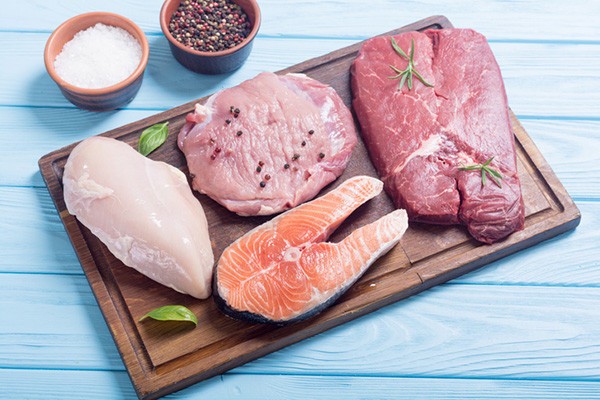The carnivore diet is a highly restrictive dietary approach that centers exclusively on the consumption of animal products. If you’re exploring the carnivore diet, it’s crucial to understand what it entails. This diet primarily consists of meat, poultry, fish, eggs, and certain dairy products, while completely eliminating plant-based foods such as vegetables, fruits, grains, legumes, nuts, and seeds. Due to its extreme restriction of carbohydrates, it’s often referred to as a “zero carb” diet.
 Selection of raw meats including chicken, pork, salmon, and beef on a wooden cutting board, illustrating the food focus of the carnivore diet.
Selection of raw meats including chicken, pork, salmon, and beef on a wooden cutting board, illustrating the food focus of the carnivore diet.
The carnivore diet falls under the umbrella of ketogenic diets, often shortened to “keto.” Ketogenic diets work by drastically reducing carbohydrate intake, which shifts the body’s primary fuel source from glucose to fat. When carbohydrate intake is insufficient, the body breaks down fat into ketones, which are then used for energy. This metabolic state is called ketosis.
While a typical ketogenic diet plan generally recommends a macronutrient ratio of approximately 70-75% of daily calories from fat, 20% from protein, and less than 10% from carbohydrates, the carnivore diet represents the most extreme form of ketogenic eating. It virtually eliminates carbohydrates altogether. The fat content in a carnivore diet is not strictly defined; it is primarily derived from the natural fat present in the consumed meat, fish, poultry, and allowed dairy.
Potential Risks Associated with the Carnivore Diet
While some ketogenic diets can emphasize healthier unsaturated fats, the carnivore diet is largely composed of animal fats, which are predominantly saturated fats. Saturated fats are considered the least healthy type of fat due to their propensity to elevate levels of LDL (low-density lipoprotein) cholesterol, often referred to as “bad” cholesterol.
A significant concern with ketogenic diets, including the carnivore diet, is their tendency to increase LDL cholesterol levels in both the short and long term. Beyond cholesterol, extended adherence to keto diets, particularly the carnivore diet, has been linked to an elevated risk of kidney stones, gout, and osteoporosis. Furthermore, the very high protein intake characteristic of the carnivore diet may place undue stress on kidney function, potentially leading to impairment.
Although the ketogenic process induced by diets like the carnivore diet can initiate rapid weight loss by prompting the body to burn fat for fuel, health experts generally do not recommend the carnivore diet specifically for weight management due to its restrictive nature and potential long-term health risks. It’s important to consider balanced and sustainable dietary approaches for weight loss and overall health.